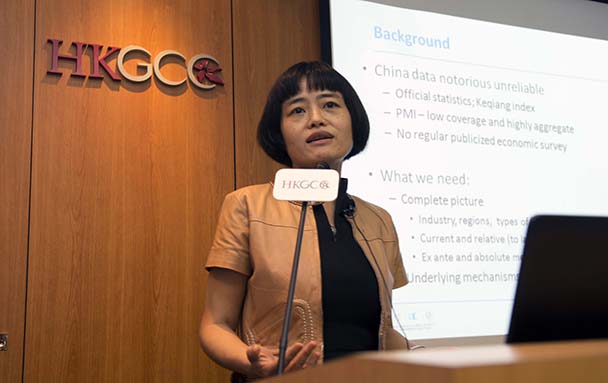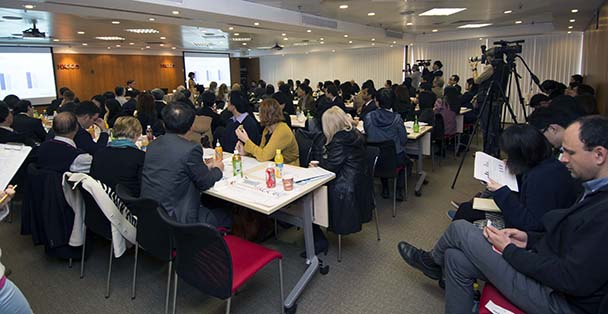Launched for the first time last year to widespread acclaim, CKGSB Finance Professor Gan Jie’s large-scale micro-survey on China’s industrial economy continues to arrive at some revealing conclusions. With China’s economy more central to the world than ever before, it comes as no surprise, then, that global media are looking to Prof Gan for fresh insight.

In the latest series of what is quickly becoming a highly successful partnership between CKGSB and the Hong Kong General Chamber of Commerce, Prof Gan spoke to a room full of senior executives from multinationals and leading domestic firms, all keen to find out what lies in store for the economy and how that might affect their respective sectors.
20 members of selected media were also in attendance and Prof Gan gave them plenty to write about. Her analysis of the past year found that while China had had some struggles, a hard landing was not likely – a topic that formed the basis of a widely distributed article by Xinhua, which also laid out some of Prof Gan’s policy suggestions:
Gan said the main problems are structural and fundamental and one should not expect for a quick recovery. She called for fundamental and systematic reform by increasing domestic demand and enhancing technological innovation. The financial expert also suggested that easing monetary policy would not boost the industrial economy, but could help buy time to resolve the problems.
The Wall Street Journal, which had previously featured Prof Gan’s Q3 report, also highlighted the Q4 version, which reviewed 2014 as a whole, while also looking ahead to 2015:
“As weak demand is the key problem, injecting liquidity through loosening monetary policy cannot revive the industrial economy,” said the survey, which was released in February and conducted by Gan Jie, an economist with the Cheung Kong Graduate School of Business in Hong Kong and Beijing.

Meanwhile, the Hong Kong Economic Journal printed some of Prof Gan’s forecasts for the year, based on the business sentiment given to her by more than 2,000 firms across a range of sizes, regions and industries:
“The central bank may want to avoid a hard landing for the economy … Looser monetary policy may also be needed because we have no idea how serious the problem of local government’s bad debt is,” Gan said. But in the long run, the industrial sector will mainly benefit from higher income levels and a lower savings rate, which can be achieved by opening up the private sector and improving public services to mitigate people’s worries about the future, she said. The survey showed that business sentiment in the coal mining and washing sector is the worst among all subsectors, followed by processing of petroleum and nuclear fuel, and processing of wood products.
In a separate interview in conjunction with Prof Gan’s talk, Bloomberg asked about the most surprising finding from her latest survey. This was Prof Gan’s reply:
In the survey, I asked people to rate the quality of the legal environment. On a scale of 0 to 10, respondents gave an average score of was 7.7 when asked about the likelihood that the legal system would uphold their contract and property rights in business disputes. If you look at the media, they tend to chase high-profile cases or interesting stories. Corruption stories are among them. But the vast majority of companies, they are just doing business. The legal environment in China is such that people respect basic property rights and business contracts. Although this score is still significantly below western standards, about 30 years ago there was no such thing as capitalism in China. There is now a free market, and that’s quite an achievement.

As well as other articles in the South China Morning Post and elsewhere, Prof Gan’s insights were also featured across an array of Chinese-language TV, online and print media. All of them – and their audiences – are eagerly awaiting the next installment of Prof Gan’s unique insights.
To read Prof Gan’s Q4 large-scale survey results and analysis in full, please click here.
References:
“Chinese industrial economic hard landing unlikely: expert”, Xinhua
“China’s Central Bank Cuts Interest Rates”, Wall Street Journal
“Monetary easing in China won’t help industry, professor says”, Hong Kong Economic Journal
“Chinese Industry Stumbling Over Excess Capacity, Sluggish Investment”, Bloomberg Brief